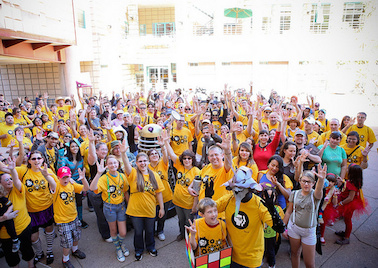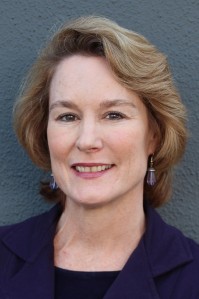Nice Above Fold - Page 374
Eight, Arizona PBS Nerd Walk inspires other community engagement events
For participants in these stations' events, being a nerd is a source of pride.NPR, WAMU limit use of Washington football team's name
An NPR editor has recommended that network journalists avoid referring to the Washington Redskins by their name and should instead use “Washington” or “the team” as much as possible. Standards & Practices Editor Mark Memmott provided the guidance Oct. 10 amid a growing backlash against a name that is a racial slur. Memmott said he is not calling for an outright ban, but that use of the name should be curtailed under the organization’s policy regarding potentially offensive language. “The team’s name is the name and our job is to report on the world as it is, not to take a position or become part of the story,” Memmott wrote.NPR podcast on Latino culture crosses over to radio
An NPR podcast hatched from a friendship four years ago took a step in its evolution earlier this month, becoming a weekly radio show focused on Latino music and culture. Edited down from the weekly podcast’s 40 minutes, the half-hour Alt.Latino debuted Oct. 2 and is airing on stations in four markets, including Denver and San Francisco. The “alt” in the title refers to the show’s exploration of subjects that co-host and co-creator Jasmine Garsd sees as underreported by other media outlets. “We started off with a lot of indie music, but as the show grew we saw it more as delving deeper into Latin culture,” Garsd said.
Pubcasters take home regional Emmys, and more awards in public media
Three programs that will run on PBS in the next year were recognized at the Jackson Hole Wildlife Film Festival.Kantor brings wide-angle lens to PBS's American Masters
The new e.p. wants to break old rules about who could or should be subjects of profiles.Public TV freelancers in Writers Guild approve contract extension
More than 200 members of the Writers Guild of America who work as freelancers in public TV have ratified a two-year extension of their current contract, which includes raises in salary minimums and additional pension contributions from WGBH in Boston and WNET in New York. The guild represents members working on national programs including Frontline, American Experience, Nova, American Masters, Nature and Great Performances. After four months of negotiations, members unanimously approved the extension Tuesday. It provides a 2 percent raise in minimum salaries retroactive to July 1, which increases to 2.5 percent July 1, 2015. Employers also will contribute an additional .5 percent to the Producer-Writers Guild of America pension plan.
KET debate proceeds without Libertarian candidate who challenged exclusion
When Kentucky Tonight host Bill Goodman introduced U.S. Senate candidates on the air the evening of Oct. 13, one was missing: Libertarian David Patterson, whose name will appear on the Nov. 6 ballot in Kentucky. Just 48 hours before, a federal judge in Frankfort rejected Patterson’s argument that Kentucky Educational Television violated his First Amendment rights by denying his request to be included in the broadcast. Patterson, along with the state and national Libertarian parties, contended that KET kept him off the program due to his political viewpoint. He sued for inclusion in the show, where incumbent Republican Mitch McConnell, Senate minority leader, and Democrat Alison Lundergan Grimes, Kentucky secretary of state, appeared.Wednesday roundup: WDET gets Knight support; Garfield interviews geniuses
Plus: A Phoenix LPFM changes format; advice for community radio stations.Eight best practices for journalists who reply to online comments
Productive exchanges with your readers aren't just possible — they're essential.Tuesday roundup: Snails disrupt Hawaii Public Radio service; CEO pay draws flak in Pittsburgh
Plus: A radio producer is a USA Knight Fellow, and Mashable covers Curious City.KQED appoints executive editor, San Antonio's KLRN hires president, and other comings and goings in public media
Holly Kernan is one of three hires for KQED News, including a new executive producer and senior editor.Monday roundup: PBS ombud takes up purported Harper's spat; WAMU euthanizes Animal House
Plus: Public radio's shifting economics, and The Moth crosses the pond.Judge denies Libertarian candidate’s request to appear on KET program
A federal judge has rejected an argument that Kentucky Educational Television violated a Libertarian candidate’s First Amendment rights by denying his request to be included in a broadcast featuring two U.S. Senate candidates. David Patterson, along with the state and national Libertarian parties, sued for his inclusion in Monday’s Kentucky Tonight show, where incumbent Republican Mitch McConnell, Senate minority leader, and Democrat Alison Lundergan Grimes, Kentucky secretary of state, will appear. Patterson is the only other candidate whose name will be on the Nov. 6 ballot. KET Executive Director Shae Hopkins praised the ruling, announced Saturday. “We believe that all journalists have the right to decide for themselves who to interview and what issues to cover,” she said in a statement.Wilson in farewell to NPR: "Thank you for the best six years of my life"
Kinsey Wilson, NPR’s outgoing chief content officer, sent this farewell email to NPR staff Friday. When I arrived at NPR six years ago, my wife remarked that it was as if I’d finally come home. Here was a place where the journalism I valued was deeply embedded in the culture. And where it was clear that curiosity, innovation and risk-taking could flourish. It was like having the New York Philharmonic and Miles under the same roof. One representing an artistry refined and perfected over many years. The other, disciplined improvisation. I tried to nurture both. Tried to develop the reporting and storytelling that is at the heart of our craft, while spurring the quest that would keep us in the game.Public radio organizations weigh in on FCC public file proposal
A proposal to require noncommercial radio stations to disclose program funders and share other public file records online has prompted widely varying reactions among public and religious broadcasters. In filings with the FCC, Native Public Media, an association representing tribal media organizations, warned that the change would be too burdensome and could lead to the demise of some of its radio stations. American Public Media Group — the largest owner of public radio stations in the U.S. — welcomed greater standards of transparency. Meanwhile, the National Federation of Community Broadcasters staked out a middle ground, proposing an exemption for stations with small staffs.
Featured Jobs






